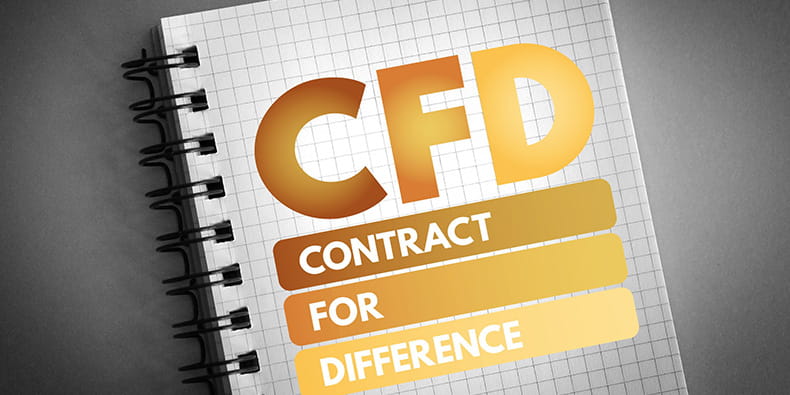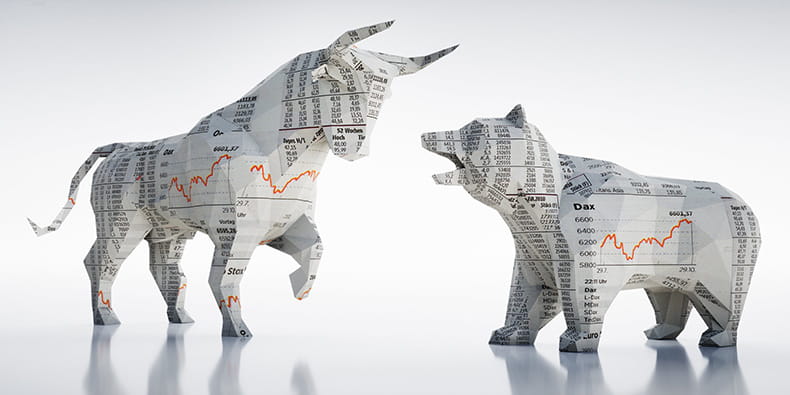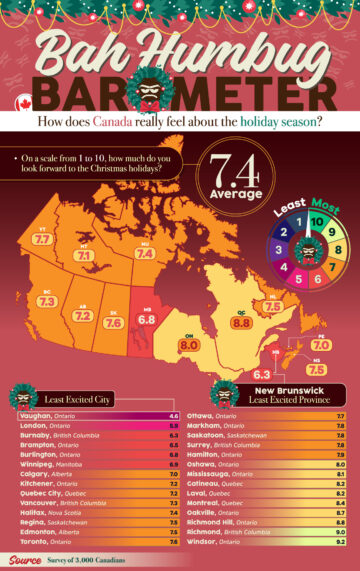CFD vs Spread Betting and Which One to Use
Before we go forward with the comparisons, we would like first to explain what spread betting and CFD trading are. In the coming sections, we will give you details on each option, compare them and show their similarities and differences. Continue reading to understand their use in the equity, forex and index markets.
Contracts for Difference (CFDs)
Being quite popular in the UK, contracts for difference, or CFDs, are derivative contracts that are signed between investors and financial institutions. With CFDs, the investors take a position on an asset’s future value. There are no securities or delivery of physical goods when you use CFDs, but the contract has a transferable value.
One of the key similarities when talking about spread betting vs CFD is that the former is used for investors to place money on whether a market will rise or fall. The contract of difference is a tradeable security between the broker and the client. They are exchanging the difference between the initial price of the asset and the final value when the trade is reversed or unwound.

Here, we can also mention one of the main differences when comparing CFD trading vs spread betting. Contracts for difference give investors the opportunity to trade the price movements of futures. It is important to note that this does not make future CFDs contracts alone. They don’t have expiration dates and are traded just like other securities with buy and sell prices.
CFDs are traded over the counter through a network of brokers who manage the market in terms of supply and demand for CFDs. In general, CFDs are short-term leveraged derivative contracts which are tracking the value of an underlying asset and pay off accordingly. Next, let’s look at spread betting and then talk about the similarities and differences.
Spread Betting
As a continuation of our guide on CFD trading vs spread betting, we will be talking about the second leveraged product – spread betting. It allows investors to speculate and place money on a wide range of asset price movements. They can vary from stocks and forex to commodities and fixed income securities.
In other words, the investor makes a bet based on their prediction that the market will rise or fall after they place that bet. This resembles the way punters place wagers on the outcome of a game at some of the best sports betting sites. One of the key features of spread betting vs CFD trading is that an investor can choose how much to risk on their bet.

Spread betting is advertised as a tax-free and commission-free activity. With it, investors can speculate on both bull and bear markets, but the bets are not transferable to anybody else. There are spread betting companies that provide buy and sell prices to investors. The buying price is for speculation if the market is going up, and the selling price if they believe that the market will crash.
In general, spread betting is quite different from traditional investing. It is more akin to betting and doesn’t require an event to happen so that a market can shift. When comparing spread betting vs CFD trading, the former can be closed at any time to cash in your profits or even limit your losses. Investors can use long and short bets. Long bets are similar to buying a share, and short bets are similar to selling a share.
Spread Betting vs CFD – Similarities and Which One to Use
So let’s compare CFD vs spread betting. Both are leveraged products that have a value deriving from an underlying asset. In both cases, the investor does not have any ownership of the assets. When using contracts for difference, you are betting on whether the value of an asset will rise or fall in the future.
Similarities of CFDs and Spread Betting:
- Leveraged products.
- Value comes from an underlying asset.
- Both are used to bet on a future rise or fall of value.
- Both don’t give the investor ownership of the asset.
- Both offer long and short positions.
- Both pay dividends for a long position.
On the other hand, spread betting is used when an investor wants to bet on the future rise or fall of a particular market. The main deciding factor is the buy and sell price quoted by the spread betting company. Both products allow an investor to take a long position if the asset or market is going to rise and a short position if their prediction is a value crash.
Differences of CFD vs Spread Betting
While both leveraged products may have a lot in common, they do have some key differences that we would like to mention in this section. In general, if you would like to be an investor and are wondering about using CFD trading vs spread betting, these differences may affect your choice.
| 🖋️ CFD | 📈 Spread Betting |
|---|---|
| No Expiration Date | Fixed Expiration Date |
| Completed Directly in Market | OTC Through a Broker |
| Pay Commissions and Transaction Fees | No Commissions or Transaction Fees |
| Applied Capital Gains Tax | Tax-Free |
As you can see from the table above, some major differences will help you pick which leveraging product to use. While CFDs have no expiration dates and are completed directly in the market, spread betting has a fixed expiration date and needs to go over the counter through a broker.
On the other hand, spread betting has some great advantages over CFDs, where the former has no commissions or transaction fees and is tax-free, while the latter is subject to capital gains tax and needs to pay fees and commission. Of course, depending on the type of investor that you are, the method you are using will vary.
What are the Margins and Mitigating Risks

When explaining what is spread betting vs CFD, we will also need to give light to the margins. In the cases of both products, the initial margins will be required as a deposit to take the position. These initial margins can vary between 0.5% and 10% of the open position value, while investors can expect even higher numbers for more volatile assets.
What is great about both CFDs and spread betting is that although the investor only paid a part of the asset’s value, they are entitled to the same gains or losses as if they covered 100% of the value. In general, risk can never be avoided. Same as playing at any online gambling site, there is risk and luck involved. Of course, knowledge and experience are key factors.
One of the tools you have to control your risk is that both CFDs and spread betting have a stop-loss order that can be set up even before the contract is initiated. This stop-loss order is a predetermined price at which the contract is automatically closed if it falls to that value. What is great when choosing between CFD vs spread betting is that some CFD providers and spread betting companies offer a guaranteed stop-loss order at a premium.
Conclusion – Final Thoughts on Spread Betting vs CFD
Well, our short guide is coming to an end, and we would like to give you a quick overview of all that we mentioned up to this point. CFDs and spread betting are financial leveraging products that investors can use to predict an asset or market’s rise or fall. Both are a bet on a future outcome and bear risks, just like when playing at the best casino sites.
While both offer relatively the same features, when comparing CFD vs spread betting, you will find some key differences that may affect your choice. One of the most notable ones is that one is used when betting on the price change of assets, while the other is for a whole market. On top of that, while CFDs don’t have expiration dates but pay fees and taxes, spread betting doesn’t have any fees or taxes but has an end date.
Frequently Asked Questions
In this final section, we would like to showcase people’s most popular queries on the subject of spread betting vs CFD trading. Check out each question and its answer to further solidify your knowledge. We hope that you enjoyed this fun and informative guide that the future investor in you will appreciate.












